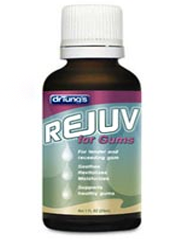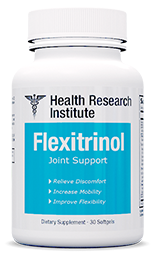ReJuv Review: Don’t Buy Before You Read This!
User Rating:
29%
 +
-
+
-
What is it?
ReJuv is a daily nutritional supplement that is designed to help improve joint health and functionality. Their advertising claims that their ingredient blend both lubricates joints and reduces the painful effects of inflammation. They recommend its use for countering the natural effects of aging, as well as for anyone that deals with minor joint and tissue stress, like recreational athletes or individuals with repetitive motion strains.
Right now our team of health and wellness experts recommend Flexitrinol as the most effective joint health supplement that’s available without a prescription. It performed the best in their series of independent trials measuring flexibility, mobility, and pain reduction. Click here to learn more about why our panel rated Flexitrinol so highly.
ReJuv Ingredients and Side Effects
| Celadrin |
Ginger |
Turmeric |
| Green tea |
Hyaluronic Acid |
Boswellia Serrata |
Celadrin: The brand name for a compound of cetylated fatty acids. These naturally occurring fats play a role in immune function and joint lubrication.
Celadrin has shown an ability to both prevent and reduce the effects of inflammation and has been used in the treatment of many arthritic diseases and autoimmune conditions. There have been no reports of short-term side effects, however there is no data available about the effects of consuming celadrin on a prolonged daily basis.
Ginger: A multi-purpose herb that has been used as a food and flavoring additive, a perfuming agent, and in various cleansers and household products.
Ginger has also been used medicinally in some cultures to help treat conditions such as nausea, vomiting, morning sickness and other gastro-intestinal issues, osteoarthritis, and painful menstrual periods.
There is very little clinical data surrounding the medical usage of ginger, and some of its potential side effects are counter-indicated to the conditions that it is prescribed for, such as nausea and vomiting. Other side effects that are possibly connected to ginger include:
- Increased bleeding disorders
- Worsened heart conditions
Ginger should not be taken in supplement form by women that are breastfeeding or pregnant, anyone with diabetes, or anyone that is currently taking blood thinners or other blood pressure medications.
Turmeric: Like ginger, probably more known as a food additive than a nutritional supplement. Turmeric is what gives curries their distinctive flavor, but it is also used in Ayurvedic medicine to treat conditions such as arthritis, heartburn, ulcerative colitis and irritable bowel syndrome.
Turmeric is thought to have anti-inflammatory properties, however the scientific evidence that backs that belief up is still in its early stages. Turmeric is generally thought to be safe for humans in small doses, however some side effects that could be associated with its consumption include:
Green Tea: Another famous food product that has been linked to some health and wellness benefits.
Green tea is high in polyphenols and antioxidants, which are useful for combating disease and the effects of aging, and it contains caffeine, which is useful for energy, alertness, and focus.
Green tea is thought to be likely effective in the treatment of genital warts and high cholesterol, and may also have some applications for human papiloma virus, coronary artery disease, and some blood pressure related conditions.
Green tea is thought to be safe when taken in small and irregular doses, however there are some concerns about its use as a daily supplement. Side effects that it is thought could result from daily green tea ingestion includes:
Serious toxicity can occur in relatively low doses, and high doses of green tea have been known to be fatal.
Hyaluronic Acid: A component of the body’s synovial fluid (the gelatinous substance that surrounds our joints) that helps lubricate and cushion movement.
Hyaluronic acid is a popular ingredient in a number of joint health supplements because of its natural presence in the body and the low chance of users experiencing any form of negative side effects.
Boswellia Serrata: An extract taken from the gum resin of the Indian frankincense tree. Boswellia serrata (BS) has become a fad ingredient in many joint health blends because it is thought to have anti-inflammatory properties, however there is no clinical data yet to back up its medicinal usage.
There is also no information about the long-term effects of daily boswellia serrata consumption, however some short-term effects that may potentially stem from ingesting BS include:
It is not recommended that pregnant or breastfeeding women ingest boswellia serrata, and if you are on any prescription medications it is always wise to consult your doctor before beginning to take BS daily.
Click here to see the complete list of all the top joint health supplement brands.
ReJuv Quality of Ingredients
When examining the ingredients panel for ReJuv there is not much to recommend it specifically as a joint health supplement.
It contains several ingredients that are thought to have anti-inflammatory properties, which is helpful for reducing the symptoms that come from having damaged joints and connective tissues, however there is almost nothing in ReJuv that works to improve joint function so as to avoid becoming inflamed in the first place.
Hyaluronic acid is the only ingredient in ReJuv that actually improves joint functionality at the core level as it is an integral part of our synovial fluid. As useful as that is, however, most joint health supplements will also contain ingredients that work to improve collagen, cartilage, ligament, and skeletal health as well.
Mostly, if ReJuv’s ingredients are going successful in improving joint function it’s going to be by reducing the stiffness and swelling associated with inflammation. Green tea, turmeric, boswellia serrata, celadrin, and ginger are all used as anti-inflammatories in traditional home remedies and so it is likely that many users will see a reduction in those symptoms.
Follow this link to see which brands of joint health supplement scored the best in our researchers independent trials.
The Price and Quality of ReJuv
ReJuv is sold through a number of online retailers, and consumers should expect to pay somewhere in this range:
- 1 60-count bottle of ReJuv capsules: $89.74
Given that ReJuv is indicated for two doses a day, after shipping and handling is paid a one-month supply costs well over three dollars per day. It is fairly easy to find a high quality joint health supplement for around one dollar per day, so this price tag puts ReJuv amongst the most expensive supplements on the market.
To see which supplements scored the best for increasing flexibility and mobility during our panel’s clinical tests, click here.
Business of ReJuv
ReJuv is a product of ReJuv USA Laboratories. Their contact information is listed as:
Phone Number: (844) 218-0155
Address: Rejuvusa Labs USA Ltd
Third floor 207 Regent Street London
England W1B 3HH
Email: [email protected]
ReJuv USA Laboratories is not accredited by the Better Business Bureau. There is no evidence of any pending legal actions against ReJuv USA Laboratories.
To learn more about the over the counter supplements that are rated the best for reducing joint pain and inflammation, click here.
Customer Opinions of ReJuv
The responses from consumers after purchasing ReJuv were somewhat mixed. Some consumers found it helpful for reducing their inflammation and joint pain, but other reports were more critical. Those responses tended to be similar to these:
“Did nothing for me. I took it for weeks and never saw an improvement.”
“I bought a bottle for my parents and it didn’t help their joints at all, but it did give my father a whole bunch of gas that we all had to deal with.”
“I feel dumb because I took a bottle of this super-expensive stuff and it did nothing, so I figured I should buy another bottle just to make sure I gave it a chance. Now I’m out nearly two hundred bucks and my knees hurt just as bad as they always did.”
Most of the complaints were related to lack of product effectiveness, however there were also quite a few remarks about the high price as well as some individuals that complained about gastro-intestinal side effects.
Follow this link to see how every brand of joint health supplement fared in our experts’ ongoing series of clinical trials.
Conclusion – Does ReJuv Work?
The consensus amongst our team of nutritional experts was that ReJuv is ineffective as an overall joint health supplement, however it may be mildly effective as an anti-inflammatory aid.
ReJuv lacks glucosamine, chondroitin, or any other additive that works to stimulate collagen production, cartilage growth and repair, or skeletal health. Hyaluronic acid can be an effective ingredient, but it is insufficient when it is the only core-health product in your blend.
The remaining ingredients are largely untested by western scientists, which is concerning to our team, but most indications are that they are generally just mild anti-inflammatory agents.
It would be tempting to suggest that ReJuv could be paired with a glucosamine and chondroitin supplement for a more holistic approach, however its high price tag makes that an ineffective option for most consumers.
Our team currently recommends Flexitrinol as their top ranked joint health supplement. Flexitrinol works to naturally stimulate the body’s joint health processes while also working to reduce inflammation. To learn more about what makes Flexitrinol so effective, click here.
Featured Diets









